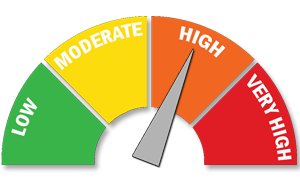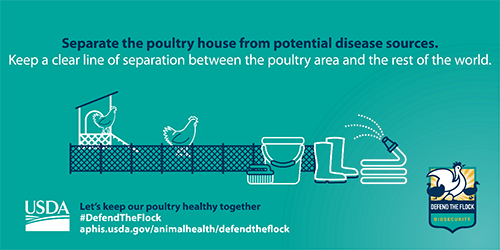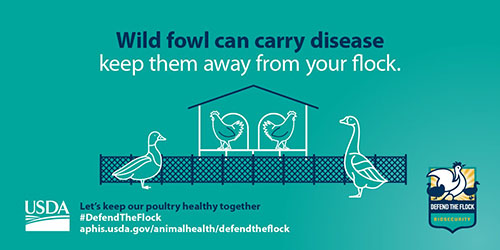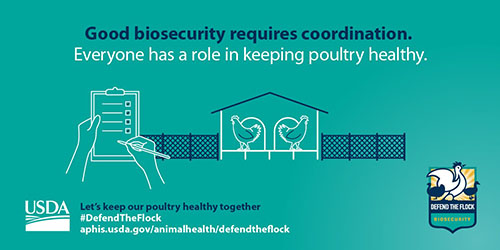DACF Home → Bureaus & Programs → Bureau of Agriculture → Division of Animal and Plant Health → Animal Health → HPAI
Highly Pathogenic Avian Influenza (HPAI)
On this page:
Status of Highly Pathogenic Avian Influenza (HPAI) in Maine
The risk for HPAI is considered high in Maine.
Receive DACF updates and alerts regarding the status of avian influenza in Maine by opting into the Avian Influenza email list.
What Maine is Doing
Maine Department of Agriculture, Conservation, and Forestry is working with the Maine Department of Inland Fisheries and Wildlife, and USDA to continue HPAI surveillance efforts in domestic and wild birds. We will continue to post updates on this page and share information via the avian influenza email list.
HPAI in Maine FAQs
How is HPAI spread? +
The current outbreak of HPAI is spreading across the country primarily due to the migration of wild birds. There is little evidence to suggest HPAI is being spread from farm to farm (lateral transmission). The virus is very prevalent in the environment in wild birds so flock owners need to practice strong biosecurity. More information on steps they can take to enhance biosecurity is available here: http://healthybirds.aphis.usda.gov.
Close -
Do we know if the infected birds are ingesting wild bird droppings? +
HPAI is spread directly through wild bird droppings and indirectly through feed, water sources, and bedding that may have been exposed to the droppings.
Close -
What kind of birds are in these backyard flocks? +
Examples include chickens, turkeys, pheasants, quail, ducks, geese, and guinea fowl.
Close -
What does the term "Nonpoultry" mean? +
Nonpoutry means meat and eggs from known infected flocks were not destined for the food chain.
Close -
What do we know about the coming months? +
Because HPAI is spread by migrating wild birds, it is difficult to predict what will happen over the coming months. Migratory waterfowl (ducks, geese, and shorebirds) will move south in the fall months and are likely to shed AI virus again. Poultry owners should work to secure indoor shelter for their birds and provide outdoor access only in covered poultry runs, allowing protection from predators and preventing contact with wild waterfowl and their droppings.
Close -
Is it safe to purchase new birds for my flock this year? +
It's always recommended to only purchase birds from a reputable source that follows effective biosecurity protocols and closely monitors poultry health. NPIP Certified hatcheries monitor their breeder flocks for important chronic diseases, and are a recommended source for new poultry. In light of the nation-wide outbreak of Avian Influenza, it is more important than ever to follow cleaning and sanitation steps and only purchase birds with known health histories. You can find more detailed guidance from the USDA Defend the Flock Checklist for Adding or Replacing Poultry.
Close -
What are the signs of HPAI in birds? +
Sudden death without clinical signs; Lack of energy and appetite; Decreased egg production or soft-shelled or misshapen eggs; Swelling of the head, comb, eyelid, wattles, and hocks; Purple discoloration of wattles, comb, and legs; Nasal discharge, coughing, and sneezing; Incoordination; or Diarrhea. Learn more.
Close -
How do I protect my flock from HPAI? +
The best approach is to practice good biosecurity – this means keeping your birds separate from sources of disease, such as infected wild birds and their environment.
Close -
What should I do if I have sick birds or large mortality in my flock or discover a sick or dead wild bird? +
Report sick birds or unusual bird deaths to State/Federal officials, either through your state veterinarian or through USDA's toll-free number at 1-866-536-7593.
Close -
Can people contract AI? +
No cases of this particular strain of the avian influenza virus have been detected in humans in the United States. According to the U.S. Centers for Disease Control and Prevention, recent detections of this strain of influenza in birds in Maine and several other states present a low risk to the public.
Close -
Does HPAI present a food safety risk? +
No, poultry and eggs are safe to eat when handled and cooked properly. Learn more on the US CDC Food Safety site.
Close -
Is compensation offered to impacted flock owners? +
Yes. Refer to the USDA APHIS website (PDF) to learn what is covered and how the process works.
Close -
Is an HPAI vaccine available? +
No vaccine for avian influenza is licensed for use in the United States. Protecting birds from this disease requires avoiding exposure to the virus through contact with wild waterfowl, sick birds, and contaminated environments.
Close -
Additional HPAI Resources
According to the USDA, all bird owners, whether commercial producers or backyard enthusiasts, should:
- Practice protective security measures to help prevent disease
- Prevent contact between their birds and wild birds, and
- Report sick birds or unusual bird deaths to State/Federal officials, either through your state veterinarian or through USDA's toll-free number at 1-866-536-7593.
For backyard and commercial poultry producers:
- USDA has many resources available for commercial poultry producers and backyard bird owners through its Defend the Flock campaign.
- Information about this campaign and links to toolkits containing biosecurity checklists, videos, and more, are available.
- Additional information and resources about HPAI and foreign animal disease preparedness are available.
DACF's Animal Health team is also working closely with the Maine Center for Disease Control and Prevention (Maine CDC). Though this strain of avian influenza has not been detected in humans in the United States, Maine CDC is monitoring the health and wellbeing of Animal Health staff and flock owners who were exposed out of an abundance of caution. Signs and symptoms of bird flu infections in people can include fever (temperature of 100F or greater) or feeling feverish, cough, sore throat, runny or stuffy nose, muscle or body aches, fatigue, headaches, eye redness (or conjunctivitis), and difficulty breathing. Other possible symptoms are diarrhea, nausea, and vomiting. As with seasonal flu, some people are at high risk of getting very sick from bird flu infections, including pregnant women, people with weakened immune systems, and people 65 and older. The U.S. CDC provides information on its website. The Maine CDC's Health and Environmental Testing Laboratory is prepared to process samples and quickly provide results for anyone potentially exposed to the virus. Learn more at Maine CDC's Avian Influenza and People resource.
Shareable Social Media Images
Link the images below to https://bit.ly/defendtheflock.
Email Newsletter Banner

Facebook and Twitter Graphics
Click the images below for larger shareable images.
Contact: Jim Britt, DACF Director of Communications, (207) 480-0558, jim.britt@maine.gov


